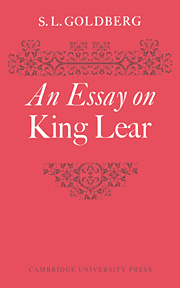Summary
It is not hard to see why many people find King Lear so unbearable that they virtually reject it. Even Dr Johnson found he had to agree with most of his age in preferring Tate's version; and although the genius of the stage has still proved able to transform the play to suit the different sentimentalities of our own day – ethical, Christian, absurdist, ‘revolutionary’, or whatever – literary criticism has generally managed to relieve with ‘interpretation’ what the eighteenth century could only remove by surgery. Johnson at least faced the play honestly, and (as usual) he put his finger on the central difficulty it presents – the difficulty, that is, of accepting what it brings us eventually to feel. It fills the mind, he said, ‘with a perpetual tumult of indignation, pity, and hope … So powerful is the current of the poet's imagination, that the mind, which once ventures within it, is hurried irresistibly along.’ Where this current takes us – or ought to have taken us – is to ‘this important moral, that villany is never at a stop, that crimes lead to crimes, and at last terminate in ruin’; and yet, he argued, in the process Shakespeare's imagination somehow overleaped one vital truth – a truth that is the foundation-stone of Johnson's objection: ‘all reasonable beings naturally love justice’.
- Type
- Chapter
- Information
- An Essay on King Lear , pp. 7 - 33Publisher: Cambridge University PressPrint publication year: 1974



